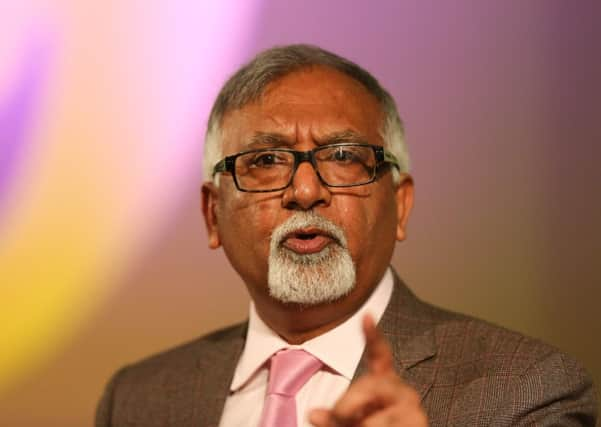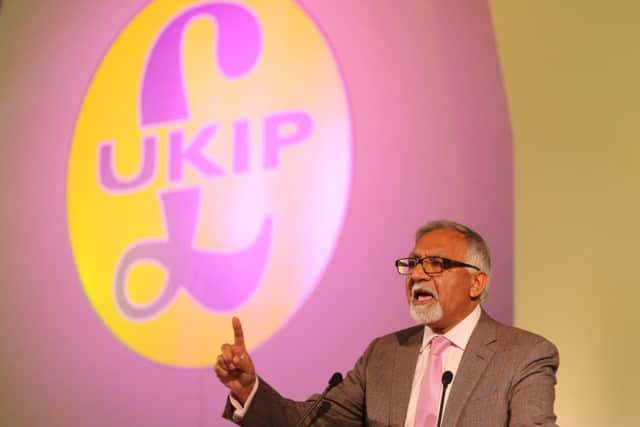What to do you do in Brussels when you’re an MEP that doesn’t believe in the European Parliament?


SITTING in the members’ bar in the European Parliament, an MEP is telling me how he just left a meeting discussing the future of Afghanistan and his concern that the withdrawal of western troops will leave the way open for drugs to pour out of its porous borders ending up in places such as Yorkshire.
So far, so routine. Except for the fact that the MEP in question is Amjad Bashir, of the UK Independence Party which, if it had it’s way, would withdraw the UK from the European Union altogether.
Advertisement
Hide AdAdvertisement
Hide AdMr Bashir finds himself in the paradoxical position of holding a job he doesn’t think should exist.


He was one of three UKIP MEPs elected to represent Yorkshire in May as the party took 24 seats nationally.
Other parties from outside the political establishment also enjoyed success elsewhere on the continent in results billed in some quarters as sending a message of discontent with the EU.
So has that message been heard in Brussels?
“Some of them have woken up because of the election success that Euro-sceptic parties across Europe had.
Advertisement
Hide AdAdvertisement
Hide Ad“But a lot of them still say ‘how dare they challenge us, we have created something marvellous’.”
And has his experience of Brussels done anything to change his opinion of how the EU works?
“I don’t disapprove totally about laws rules and regulations, a lot are for the benefit of society, but I feel a lot of the time the EU gilds the lily,” he says.
“That’s been reaffirmed now I am here. There are massive talking shops, legislation upon legislation.”
Advertisement
Hide AdAdvertisement
Hide Ad“The big (political) groups prevent any sort of real debate taking place to modify that legislation.”
Mr Bashir explains his engagement on the Afghanistan question is part of a new approach by Ukip to be more active in the Parliament this term. Its previous determination to have little if any involvement had seen critics argue - unfairly Mr Bashir insists - that Ukip MEPs were happy to claim expenses while doing little work.
However this new approach can pose unique problems for a party like Ukip. Mr Bashir recently voted for a resolution calling for ceasefire in response to the recent violence in Gaza while many of his colleagues voted against.
Asked about the reasons, Mr Bashir says he was pursuing his party’s policy of support for a two-state solution, while his colleagues were acting on their conviction that foreign policy should be a matter for nation states, not the EU.
Advertisement
Hide AdAdvertisement
Hide AdEven with its new approach to the day-to-day workings of Brussels and Strasbourg, Ukip’s position certainly sets it apart from the other parties representing Yorkshire.
Labour leader Ed Miliband has said the UK’s future is in Europe while David Cameron has promised if the Conservatives are returned to power in Westminster in May he will renegotiate Britain’s membership of the EU and put the result to a referendum - a move that commits Britain to the EU until 2017 at least.
Yorkshire’s sole Conservative MEP, Timothy Kirkhope, says there has been a mixed reaction on the continent to May’s election results.
“I would hope that politicians will be reflecting carefully on that. I think Conservatives here have reflected on the fact there seem to be issues where we haven’t given people a full enough answer, on immigration for example.
Advertisement
Hide AdAdvertisement
Hide Ad“But I would say in other countries where there has been an anti-establishment vote, not so much an anti-European one, I think a lot of MEPs seem completely and utterly oblivious, they are not going to change their habits and I think it is a big mistake.
“What Europe needs, frankly, is good public relations.”
As an example, Mr Kirkhope points to his work on passenger name record information to make it easier to access information on airline passengers as part of efforts to combat terrorism as an area where people should see EU co-operation is more effective than 28 countries acting independently.
“Our approach to Europe is reform, getting change here. People say it is not achievable but I believe it is.”
Like Mr Bashir, Richard Corbett is settling into life in Brussels after being elected in May although for him the experience is not entirely new having represented Yorkshire in the Parliament until 2009.
Advertisement
Hide AdAdvertisement
Hide AdBut that is where any comparisons end. Mr Corbett is dismissive of the impact Ukip can have and questions whether the European elections did convey anti-EU sentiment to the degree that has now become received wisdom.
He argues that the Parliament’s history shows anti-EU parties have always featured and that countries that were among the hardest hit by the financial crisis, such as Spain, have not seen such forces emerge.
Ukip, he says, are the “BNP in blazers” and they and similarly minded groups are not a “cohesive force” in the Parliament.
“If the one thing you have in common is that you hate foreigners it is a bit hard to work together.
Advertisement
Hide AdAdvertisement
Hide AdThis is crucial, he says, in a Parliament where building coalitions of support is the only way to get things done.
“If you are talking about reforming the EU they are not the ones that are going to do that but there’s an awareness reform is needed. The impact of the (financial) crisis has been huge.
“They don’t support reform of the EU but walking out and slamming the door which is a recipe for economic suicide.”
His Labour colleague, Linda McAvan also thinks that a proper examination of the minor parties who succeeded across Europe in May reveals a complex picture.
Advertisement
Hide AdAdvertisement
Hide Ad“The fact that significant numbers of people are discontent has been heard. The problem is the discontent has different causes in different communities. Each country has produced a lot of new parties that have all got very different agendas.”
She continues: “I’m worried about the rise in populism, people promising everything to increase expenditure, cut borrowing and decrease everybody’s taxes. The big problems society faces are complex, there aren’t black and white answers to everything.”
Mrs McAvan is also concerned that Britain’s influence in Europe is diminished by threats to leave. “They feel the UK is hostile,” she says and points out that, with English widely spoken in Brussels, whatever politicians say at home is quickly picked up there.
“If Britain sits at the table and wants special allowances for the UK, but if you might not be here in two years time why should they make special allowances for people who want to get out?”